5 Questions to Ask When Buying a New AC

Choosing a new AC air conditioner is a big decision—one that can affect your Southern Arizona home’s comfort, energy bills, and peace of mind for many years to come. With the intense summer heat common in Tuscon, having an AC system that’s properly sized, energy-efficient, and reliable is more important than ever.
But with so many models, features, and price points available today, it’s easy to feel overwhelmed by the options. That’s why asking the right questions up front is essential.
Knowing what to ask will help you focus on what truly matters for your home, budget, and lifestyle to make a confident, informed choice. Whether you’re replacing an outdated unit that’s no longer keeping up or installing air conditioning in a newly built home, the team at Hamstra Heating & Cooling is here to help.
In this blog, we’ll cover the questions—and ideal answers—to the following must-ask questions of any HVAC contractor near you before investing in a new air conditioning system.
- What size air conditioner do I need for my Tuscon, home?
- How energy-efficient is this unit?
- What features and technology are included?
- What are the installation and maintenance requirements?
- What warranties and service plans are available?
1. What size air conditioner do I need for my Tuscon, home?
Size is one of the most critical factors in choosing the right air conditioning unit. Contrary to what some might think, bigger isn’t always better. An oversized AC may cool your home too quickly, causing it to cycle on and off frequently, which leads to higher energy bills and more wear and tear. On the other hand, an undersized unit will struggle to cool your Tuscon, home, running constantly and still failing to keep temperatures comfortable.
To get the right size, a professional HVAC technician will typically perform a load calculation, which takes into account your home’s square footage, insulation, window placement, ceiling height, and local climate. This process ensures you get an AC system that can handle the cooling needs of your space without wasting energy or compromising performance. Don’t skip this step—it’s the foundation of a smart investment.
2. How energy-efficient is this unit?
Energy efficiency plays a major role in both your utility bills and your environmental impact. Air conditioners are rated using SEER (Seasonal Energy Efficiency Ratio), and the higher the SEER rating, the more efficient the unit. While a standard AC might have a SEER rating of 14 or 15, high-efficiency models can reach 20 or more.
Though higher-SEER systems typically come with a higher price tag, they often lead to long-term savings by lowering your monthly energy bills. Additionally, some states and utility companies offer rebates or incentives for choosing energy-efficient equipment. Ask your HVAC provider to walk you through potential savings over time so you can weigh upfront costs against long-term value.
3. What features and technology are included?
Modern air conditioners come with a variety of features that can enhance your comfort and convenience. For example, variable-speed compressors can adjust cooling output based on real-time demand, improving efficiency and keeping your home at a more consistent temperature. Some models offer humidity control, which is especially beneficial in hot, muggy climates.
You’ll also find smart thermostat compatibility and Wi-Fi-enabled systems that let you control your AC remotely from your phone or integrate it with your Tuscon, home automation system. These features may not be essential, but they can significantly improve your day-to-day experience and may even help you save on energy costs through better control.
4. What are the installation and maintenance requirements?
Proper installation is just as important as the unit itself. Even the best AC system won’t perform well if it’s installed incorrectly. Ask the contractor about their installation process, whether they follow manufacturer specifications, and if they perform a full system check before finishing the job. A quality installer should also inspect your ductwork to ensure it’s in good shape and not leaking conditioned air.
In terms of maintenance, find out what kind of upkeep the unit will require. Most systems need regular filter changes, seasonal tune-ups, and occasional cleaning of coils and drains. Some warranties may even require professional maintenance to remain valid. Knowing what’s expected can help you budget and avoid costly breakdowns in the future.
5. What warranties and service plans are available?
Air conditioning systems are long-term investments, so it’s smart to understand the warranties and service options available. Most manufacturers offer a standard limited warranty on parts, but coverage length and terms can vary. Some also provide extended warranties for an additional cost, which may include labor or compressor replacement.
Beyond the manufacturer’s warranty, ask your HVAC contractor about service plans that cover routine maintenance or repairs. These plans can provide peace of mind and ensure that your system runs efficiently for years to come. Be sure to read the fine print and ask questions if anything is unclear. A strong warranty backed by a reputable installer can make all the difference down the road.
Consult With the AC Professionals in Tuscon
Buying a new air conditioner doesn’t have to be complicated, but it does require a bit of planning. By asking the right questions—about size, efficiency, features, installation, and warranty—you can avoid common pitfalls and make a choice that pays off in comfort, cost savings, and reliability.
Partner with a trusted HVAC professional in Tuscon, and the surrounding greater Tucson area, like Hamstra Heating & Cooling, who takes the time to understand your home and your needs, and you’ll set yourself up for years of cool, worry-free summers.
Call 520-629-9833 or request service online to learn more today.
